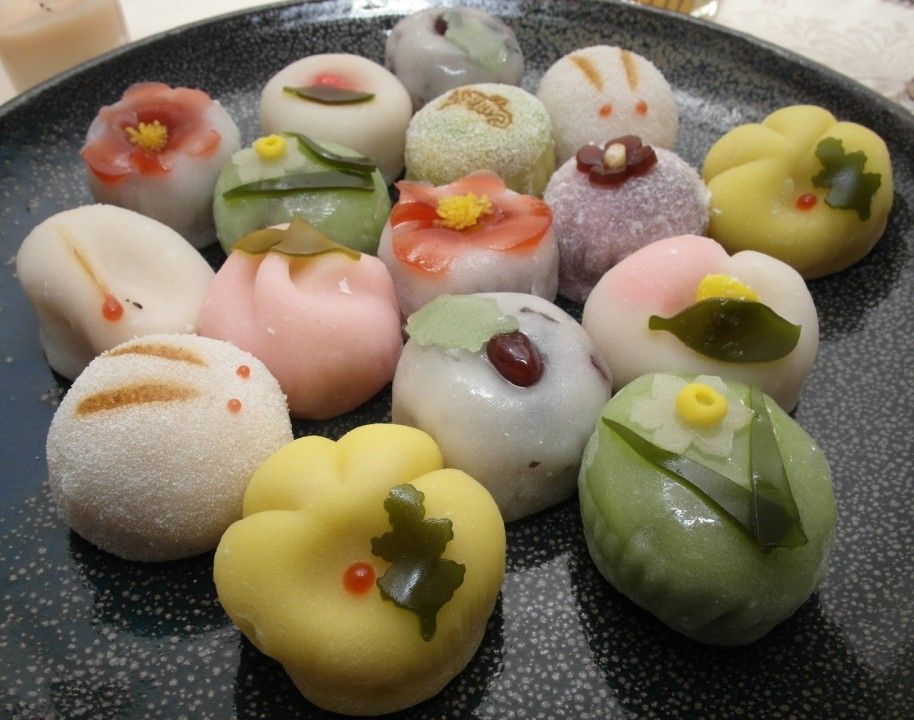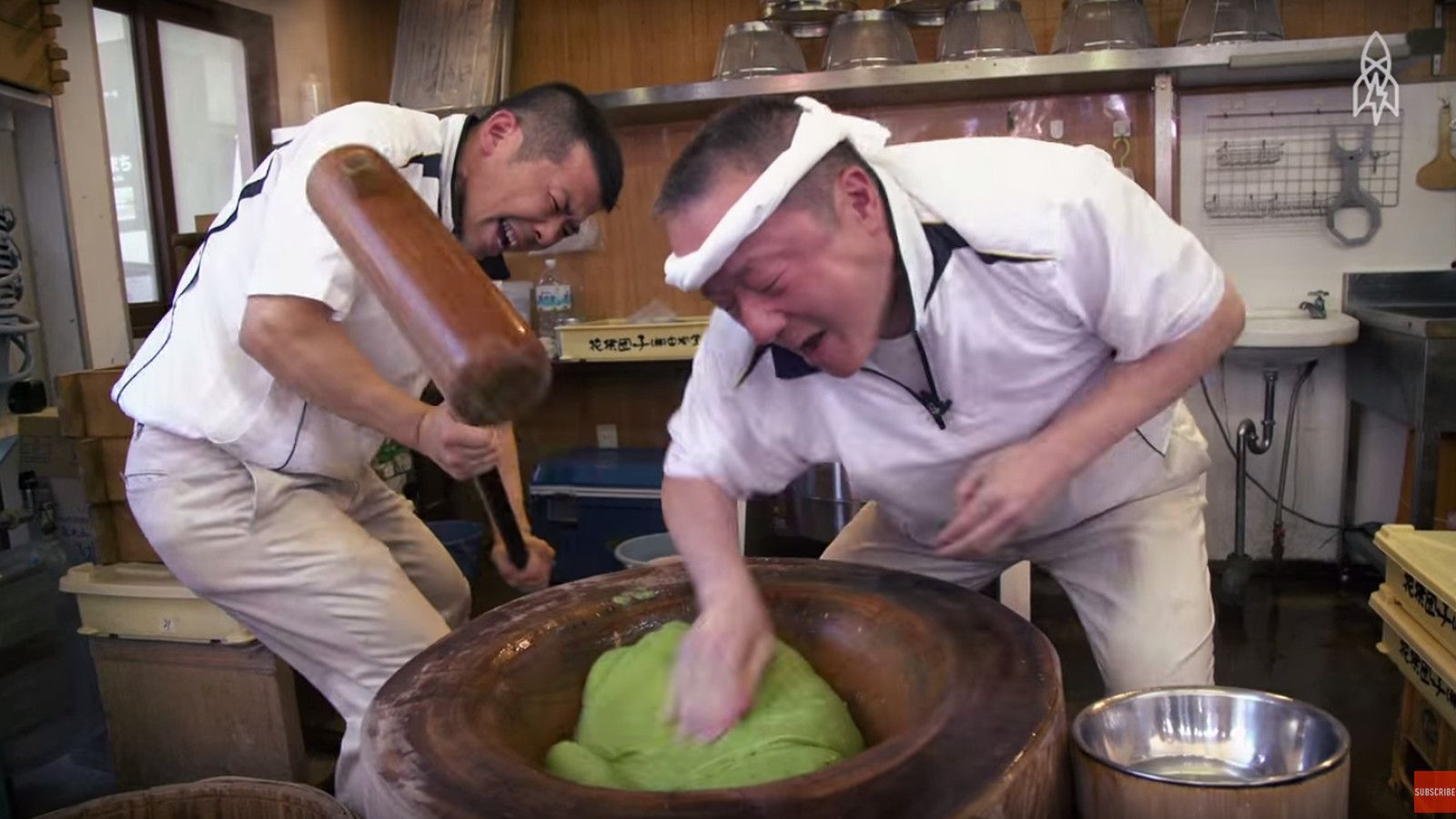As karateka, we have to understand that many of the challenges we encounter have been encountered by others before us, and we can benefit from that wisdom; and more importantly, the nature of things and people is fundamental to them, and we must work with that nature and in accordance with it.
Mochi wa Mochiya 餅は餅屋 [pronounced “moh-chi wah moh-chi-yah”] means “[get] rice cakes from a rice cake shop" — and presents two very important, but different, ideas about understanding and accepting the nature of things and people.
At its core level, we should understand the literal meaning of mochi wa mochiya 餅は餅屋: if you want to buy mochi (rice cakes that generally have different sweet and savory fillings), the best place to go is to a mochi store.

A mochi store (a "mochiya 餅屋") will have a great selection to choose from and knowledgable store workers that can suggest different types. While it is possible to buy mochi at a variety of stores, a mochi store will have the best selection and the best mochi.
With this understanding of the literal meaning, there are two very important concepts to explore.
The Right Tool for the Job
Sometimes we're faced with different choices in our projects, work, and relationships. We can choose direct paths, or we can choose indirect ones. We can use substitutes for things we need; instead of performing tasks in a recommended way, we can choose alternate ways of accomplishing the same thing. We can take "shortcuts" and we can skip steps in instructions.
But substituting tools, parts, or steps in instructions can lead to actually taking longer to accomplish our goal or finish the project. Sometimes, this kind of substitution can lead us to failing to accomplish our goal completely.
In this context, we tried to buy mochi from someplace other than a mochi shop: and the result is that we ended up with poor mochi, or none at all.
The idea here is a lot like the expression "the right tool for the job" – getting the right tool can many times make all the difference in a successful job.
Need a hammer, but instead you hammer the nailhead with the butt of a screwdriver? Possibly that will work – but surely a hammer would have been a better choice and you would have gotten the job done that much faster.
So keep in mind what mochi wa mochiya is teaching: use the right tools, get the right instructions, understand and follow the recommended processes. It makes a big difference.

Sometimes, the Cat is Really Just a Cat, and not a Tiger
There is another important concept associated with mochi wa mochiya. And that really goes to the existential heart of what things and people are, and can be.
As much as we might want, we can't buy a bicycle at a mochi shop. And (we hope) you can't buy mochi at a bicycle shop. You just can't.
And this applies to people as much as it applies to things. As much as you might want an existing employee to be able to grow to become a leader, it's possible they just can't. Perhaps, by temperament or skill or even desire, they simply can't be leaders.
Ascribing attributes to a person that don't exist is the same as walking into a mochi shop and demanding to see their selection of bicycles. Not only is it futile to do so, it's delusional.
Yet, many people do the equivalent of shopping for biycles in mochi shops. We ascribe characteristics to potential romantic partners that simply don't exist; we have unrealistic hopes for employees that they can't possibly fulfill.
In the dojo, there is an idea that helps guide whether to admit a potential new student to train at the dojo, or not. It goes like this: at the dojo, our goal in training is to take a spark, and fan it into a forest fire. However, the dojo doesn't sell matches. If there is no spark to begin with, there just isn't enough to make a karateka out of someone who just isn't ready or able to be one.
Fundamental Nature is Fundamental
As karateka, we are high-achievers and we seek out and value efficiency and creativity. It can be hard to understand and intuitively accept, perhaps, that there is a right tool for a job, a best set of recommended instructions, and a right way to proceed forward.
Yet, we must accept these things: in general, many of the problems we try to solve and the situations we encounter have been solved by others before us. They've figured out the right path forward, the right processes, and the right tools and resources needed to most efficiently accomplish the mission at hand.
Take advantage of this stored wisdom: the mochi at the mochi shop really are the best ones out there.
And as karateka, we not only see the best in others, we expect others to be at their best, and to want to strive for that excellence. But not everyone is a karateka, or is capable of being one. And we need to understand that, and not only accept this fact, but also, in a positive way, encourage and nurture others to find their best and highest role.
Whether that role is in employment, or in a relationship, or as part of a team, accepting people for what they are and celebrating that is an important and even vital, insight into the nature of people.
The mochi is best at the mochi shop, and the mochi shop is the best place to go for mochi.
| Kanji/Katakana | Meaning |
|---|---|
| 餅 | mochi "rice cakes" (mochi) |
| は | for (wa) [particle] |
| 餅 | mochi "rice cakes" (mochi) |
| 屋 | shop (ya) |
Editor's Note: This lecture was first delivered by Sensei at the Goju Karate dojo in San Rafael, California on 3 June 2015; this concept was presented again at the Goju Karate NYC Dojo on 26 July 2023.



![Taikibansei — Great Talent, Evening Forming 大器晩成 [Edition 2025]](https://images.unsplash.com/photo-1534447677768-be436bb09401?crop=entropy&cs=tinysrgb&fit=max&fm=jpg&ixid=M3wxMTc3M3wwfDF8c2VhcmNofDIzfHxzaG9vdGluZyUyMHN0YXJ8ZW58MHx8fHwxNzQ0MTU3MTQzfDA&ixlib=rb-4.0.3&q=80&w=720)
![Gaden Insui — Pull Water to My Own Rice Paddy 我田引水 [Edition 2025]](https://images.unsplash.com/photo-1512117789060-5de1ecef9eb7?crop=entropy&cs=tinysrgb&fit=max&fm=jpg&ixid=M3wxMTc3M3wwfDF8c2VhcmNofDF8fHN0YW5kJTIwdXB8ZW58MHx8fHwxNzQzMzYwMTAzfDA&ixlib=rb-4.0.3&q=80&w=720)
